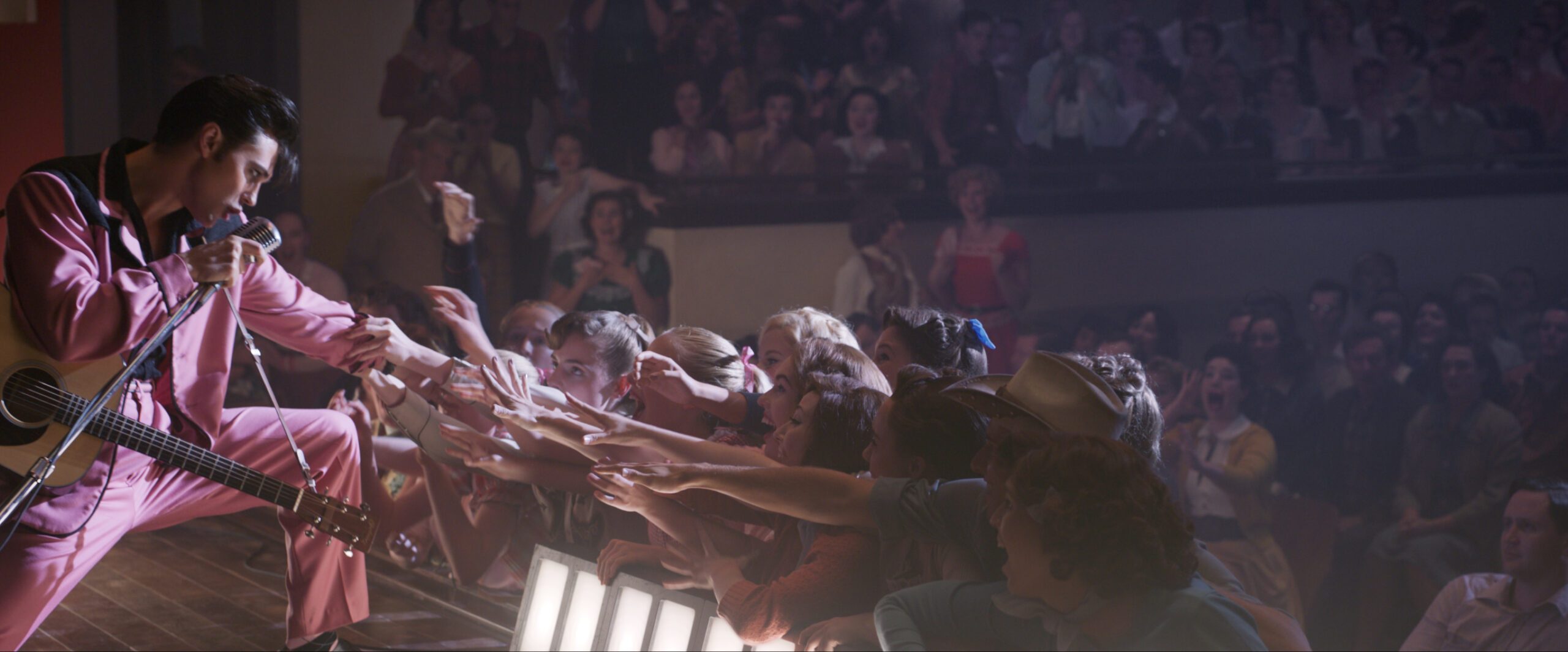SUMMARY
This is AI generated summarization, which may have errors. For context, always refer to the full article.

In tracking the life of the so-called “King of Rock and Roll,” one might argue that such a figure represented the quintessential American mythos. After all, what’s a greater example of American exceptionalism than the achievement of a white man who used the intersections of capitalism, race, and music to break beyond the mundane and ordinary? From the segregation era, the tail end of the Hollywood golden age, the civil rights movement, and subsequent domestic crises, the shifting norms of Western culture were being challenged just as Elvis began gyrating, much to the bewilderment of his confounded but mostly smitten fans.
Elvis’ legacy, no matter how glittery and successful, wasn’t spared from controversy. In a 1985 People article, Priscilla Presley noted how Elvis met his soon-to-be wife when she was still in the ninth grade (for reference, Elvis was 24 while she was 14). What followed was brandished by many as grooming, with Elvis even declaring that Priscilla was “young enough that I can train her any way I want.” Critics have also attacked the King for his alleged appropriation of black music as he drew from the blues and Black gospel music for many of his songs, sometimes even making direct references to them. This can be attributed to his experience growing up listening to blues musician Arthur Crudup and other black artists from Memphis, his hometown.
But, as with many real-life figures, the story behind the real man isn’t so black and white. Elvis greatly benefited from the artistry of black communities, which couldn’t even get a lick of national attention, but he also made a concerted effort to credit his sound to black artists like Big Mama Thornton, Sister Rosetta Tharpe, and Little Richard. Priscilla, still kicking at the age of 77, has sung her praise for Elvis throughout the years despite a bitter divorce between the two influenced by infidelity and substance abuse. So given the complexity and murkiness of such a man, one would think that a film dealing with such subject matter would dispense with oversimplifications and dichotomies, but those are exactly what Elvis does.
Director Baz Luhrmann (Moulin Rouge!, The Great Gatsby) wants to point to a villain as the root cause of all the troubles and afflictions of the unsuspecting hero. In fact, Luhrmann wants the audience to know who is to blame in the first few minutes with bold, underlined text along with iridescent, sparkling ornaments that overwhelm one with a sense of impending catastrophe. The villain most certainly isn’t the King, nor is it the greater American society; it’s Col. Tom Parker (Tom Hanks) and the greed he envelops among Elvis’ parasites.
And, of course, Elvis (Austin Butler) is the invulnerable hero. A self-professed reader of Captain Marvel comics, he channels his own version of God-given superhero powers through singing, grooving, and looking mighty fine. He was Superman for most of the ’50s until the ’70s. A figure of grandeur for most, a carnival act for some, and a symbol of transgression for others. Going up against him is a slimy and greasy personality who wants nothing else but money. The film is defined by their matchup and, as a result, glosses over every bit of controversial gray areas mired in the eponymous character’s life and the impact he had on his fans.
If the film had just slowed the heck down and not been too swept up in its whirlwind pace, then maybe the message could’ve been more nuanced. The stylistic choices to accentuate the excess and sexual provocation that catapulted Elvis into the hall of fame through flashy sequences and “Michael Bay-like” editing were understandable, but it should not have come at the expense of coherent storytelling, particularly in the first half. Once the Warner Bros. logo pops up with serene and multicolored jewels, Luhrmann assaults the audience with a devil-may-care attitude through an overwhelming array of visual and expository heaves. Perhaps, no origin story for a superhero has been this messy since Man of Steel.
Like its superhero equivalents, Elvis shines when it gives exactly what its audiences want. In the case of Marvel and DC flicks, it’s bombastic action and nostalgic fan service; for Elvis, it’s bombastic concert-like renditions that attempt to recreate each move and inflection of a famous person for nostalgic purposes. Initially, the film was posturing itself to do something unique: tell the hero’s journey from the villain’s point of view. But as the film moved on, it’s almost as if the writers chickened out and refused to intentionally showcase any distorted framing devices, staying firmly in Elvis’ vantage point for two-thirds of the film. Instead of a kind of Rashomon treatment for a sullied hero, audiences got a mediocre biopic hiding behind bells and whistles.
The one whistling, though, is indisputably suited for the role. Austin Butler gives the performance of a lifetime, and even sounds incredible as Elvis Presley. He conveys the childlike, awkward, and gentle veneer that immediately transforms into a fiendish and dangerously hypnotic sheen once he steps onto a stage. The makeup, costumes, and luminous set designs all complement Butler’s androgynous charm. He’s so good, in fact, that he outshines just about every other character and actor in this film. There’s no point in even acknowledging Tom Hanks’ performance as Col. Tom Parker — it’s that bad. He plays him like a caricature, a spoof of just about every greedy side character who makes viewers grateful that they were only in just five or 10 minutes of the film. Unfortunately, there is too much Hanks in this film, and while that may be a good thing in other films, it’s insufferable in this one.
Ultimately, Elvis is not maddeningly bad, but it isn’t exceptional either. In biopics, it’s a “damned-if-you-do and damned-if-you-don’t” situation almost every time. Either the film tells a completely faithful and mediocre story that ends up not living up to the real-life figure, or the film brings out all the big guns and entertains the heck out of the audience without any regard for coherency. Elvis attempts to accomplish both and fails despite looking and sounding pretty while doing so. – Rappler.com
Elvis is now showing at Philippine cinemas.
Add a comment
How does this make you feel?

There are no comments yet. Add your comment to start the conversation.